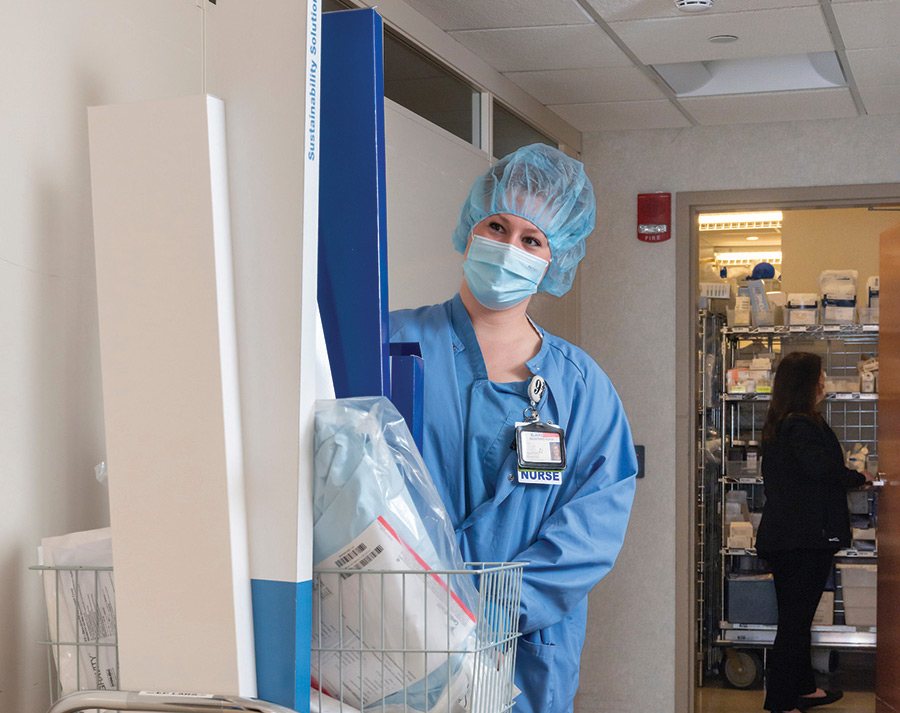Behind the Scenes
Technology Helps Supply Chain Management Pros Track Life-Saving Supplies
By Hilary Waldman / Photos by Chris Rakoczy
On any given day, supply room shelves at Hartford HealthCare’s seven hospitals are stocked with more than $30 million in supplies for procedures that improve and save lives.
You’ll find stainless steel needles, flexible tubing and more plates and screws for bone and joint repairs than in the aisles of Home Depot. Supplies are as simple as sterile drapes and sponges and as complex as implantable pacemakers and heart stents coated with blood-thinning medication.
If you end up with too much inventory, a device might expire, sending a $45,000 heart pump or $5,000 stent into the trash. Every year, disposing expired products tallies $1.3 million in wasted money.
When a needed item is out of stock, expensive overnight delivery can also drive up costs and risk delaying or canceling a procedure.
It’s a delicate balancing act, played out daily and orchestrated by supply technicians and clinical coordinators from Supply Chain Management teams. Most of the time, they use old-fashioned paper logs and multi-colored stickers to track what comes in, what goes into a patient and what supplies might be nearing the end of their shelf life.
This summer, HHC will introduce an advanced inventory tracking system called Tecsys to replace paper and stickers with hand-held scanners in procedure and perioperative supply rooms across the system. This technology will interface with the current Peoplesoft and Epic systems.
When supplies are delivered to the periop and procedural areas, technicians will use the hand-held devices to scan bar codes on each box or bundle. The codes will track quantities of each item on the shelves and their expiration dates. It can also flag users if an item has been recalled, improving patient safety
The automated system will give supply coordinators a view across the system, so if, for example, Hartford Hospital has an item nearing expiration and St. Vincent’s needs one now, it can be shared, avoiding waste, said Angela Hinman, RN, liaison to supply chain for the Heart & Vascular Institute.
The scanners will also help with billing, making it easier for nurses to document in the patient’s medical record every supply used during a procedure. This ensures Hartford HealthCare is reimbursed fully by payers.
“Tecsys is going to be a new tool in our toolbox that’s going to improve the efficiency of our organization,” said Sean Halloran, procurement lead for Supply Chain Management. “It’s going to have an incredible downstream effect.”

A new advanced inventory tracking system will replace the paper and stickers that has been used to record supplies across Hartford HealthCare.
Army of One Female Mechanic Works on LIFE STAR Helicopters
By Brian Spyros / Photo by Rusty Kimball
To put it simply, Erica Holland has a really important job — she makes sure the LIFE STAR helicopter based at MidState Medical Center is ready to go at a moment’s notice to help those in need of life-saving care.
As if that’s not impressive enough, she’s the only female aviation maintenance technician for Air Methods Corp., the company that manages and operates LIFE STAR.
“Growing up, my dad was an aviation buff and did a lot of mechanical work on cars,” Holland explained. “I decided to follow in those footsteps and thought what better way to get into aviation then with the armed forces.”
Holland started basic training in 1992 right out of high school. From there, her hands-on training took her to South Korea at the age of 19, working on a U.S. airbase on Black Hawk helicopters. She was later stationed on an aircraft carrier in the Atlantic Ocean as crew chief with the 10th Mountain Division, assisting troops as they flew into Haiti on peacekeeping missions.
“At that point, I realized I had the best job in the Army. I wasn’t just on the ground fixing aircraft and waving to them as they flew away. I was going with them,” Holland said.
Her military career advanced and she rose to the rank of master sergeant. The Army brought her all over the world fixing Black Hawks and supporting transport of ground troops in places like Germany, Kosovo and the California desert, where she was heavily involved in military exercises.
The Massachusetts native eventually came to Connecticut, stationed at Sikorsky in Stratford to help in the purchase of Black Hawk helicopters for the military. She was then redeployed overseas to Iraq, Afghanistan and back to South Korea. Through it all, she was surrounded by men but made a name for herself due to her expertise and knowledge.
“I never felt like I didn’t belong,” Holland said.
Retiring from the army in 2013 after 20 years, her skill set would only continue to grow. She became certified to fix civilian aircraft and began working for an aviation company in Wallingford as the only full-time mechanic. There, she fixed countless types of aircraft. In 2020, she began at her current job.
“The thing I enjoy about this job is that it kind of brings me back to where you’re doing work for a larger purpose,” she said. “My work with LIFE STAR supports the community and is impactful. It’s a sense of purpose you lose when you leave the Army.”
Holland added that when she left the Army, she was seeing a gradual increase in female service members. She encouraged young women to follow their dreams.
“Absolutely try. You have a place and you belong as long as you work hard and prove your worth,” she said.
